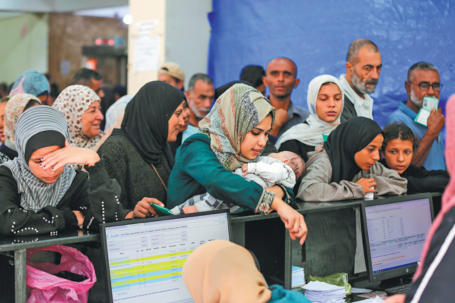source: editor:Zhang Wenni

The World Food Programme has warned that the dire humanitarian crisis in Gaza could escalate into famine, appealing for more secure and functional entry points into the war-torn area to enable much-needed aid to flow in.
The renewed alarm came a day after the Israeli parliament approved new legislation banning the United Nations Palestine relief agency, UNRWA, and two weeks after the Integrated Food Security Phase Classification projected that 1.95 million people in Gaza, or 91 percent of the population, would face acute food insecurity.
Restrictions on humanitarian aid coming into Gaza are severe. This month, only 5,000 metric tons of food were delivered to the enclave, amounting to just 20 percent of basic food assistance for the 1.1 million people who depend on the World Food Programme's lifesaving support.
The WFP said it currently has about 94,000 tons of food — enough to feed 1 million people for four months — ready to go to Gaza, with 46,596 tons positioned in the Israeli port of Ashdod, Egypt and Jordan. It stands ready to bring the urgently needed supplies but " (needs) more border crossing points to be open and for them to be secure".
The WFP also reiterated that UNRWA is "indispensable" in providing lifesaving aid and social services in Gaza, responding to the Israeli parliament's move.
UN Secretary-General Antonio Guterres, who is banned in Israel, sent a letter on Tuesday to Israeli Prime Minister Benjamin Netanyahu, outlining "the issues of international law that have been raised" by the new Israeli legislation.
The UN also stressed that the Israeli government will have to meet the needs of Palestinian refugees under international law if it cuts ties with UNRWA.
Separately, UNRWA chief Philippe Lazzarini has written to the president of the UN General Assembly calling for "decisive intervention" to help his agency carry out its mandate in the occupied Palestinian territory, Al Jazeera reported.
Lazzarini said the rules-based international order "is crumbling in a repetition of the horrors that led to the establishment of the United Nations, and in violation of commitments to prevent their recurrence", adding the attacks on UNRWA "are an integral part of this disintegration".
Abdalfatah Asqool, a former international law lecturer at the University of Palestine, told China Daily that Israel has been "using hunger as a weapon against civilians in the Gaza Strip" since October last year by banning humanitarian aid entering the region, which "clearly violates the rules of international humanitarian law".
"Doubtlessly this Israeli law is violating the rules of international humanitarian law. As the occupation authority, during the armed conflict, (it) is obliged to reduce civilian suffering and facilitate the mission of humanitarian agencies, especially the UN agencies," Asqool said.
"Even if the Israelis claim that they will handle the humanitarian relief, this doesn't legitimize their law. And they have no right to do so."
Fresh bombardments
On the ground, Israel pummeled the Gaza Strip with new bombardments that killed at least 20 people on Wednesday, Palestinian medics said, a day after one of the deadliest single strikes of the year-old conflict killed scores in the north of the enclave.
Eight of Wednesday's victims were killed in a strike in the Salateen area of Beit Lahiya in northern Gaza. The area is near where medics said at least 93 people were killed or missing on Tuesday in an Israeli strike.
Meanwhile, a Hamas official said on Wednesday the group had not received any proposals for a Gaza cease-fire but would discuss any ideas that include an Israeli withdrawal.
"We are prepared to engage with any ideas or proposals presented to us, provided they ultimately lead to an end to the war and a withdrawal by the army from the Strip," the official told AFP.
Agencies contributed to this story.